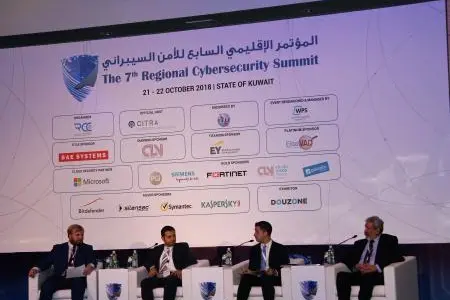PHOTO
KUWAIT CITY, KUWAIT – Microsoft this week marked its presence as the Cloud Security Partner at the 7th Regional Cybersecurity (RCS) Summit in Kuwait, a key event hosted by the Communications and information Technology Regulatory Authority (CITRA).
Organized by ITU Arab Regional Cybersecurity, in collaboration with White Paper Summits (WPS), the RCS Summit took place on 21-22 October at the Jumeirah Messilah Beach Hotel in Kuwait City, and focused on a vast range of key topics to highlight current trends and future security issues that affect the virtual security of organizations, and interfere in business efficiency. The Summit is hosting 250+ key attendees from across the Middle East to discuss partner and form new ideas, policies and present the latest technological advancements that can help in battling cyber coercions.
“The fourth industrial revolution is upon us and is transforming the way we work and live”, said Eng. Salim Al Ozainah, Chairman and CEO, Communication and Information Technology Regulatory Authority (CITRA). This calls for a significant need of cybersecurity to be on the agenda of every organization in the country and the wider region. The RCS Summit is a cornerstone of our effort to create shared learning and dialogue regarding cybersecurity challenges and facilitate the exchange of information, ideas, solutions, and emerging practices that could improve security posture in the region. We commend the efforts of partners like Microsoft for their participation in this event and sharing the best practices to empower governments and organizations take the right security measures.”
The RCS Summit covered keynote presentations, case studies, panel discussions, and technology showcase & demos to enhance the knowledge and understanding of all delegates and attendees to deal with various aspects of Cyber threats and digital security issues.
Mohamed Zayed, Cybersecurity Lead for Microsoft Kuwait, delivered a keynote session titled ‘The Culture Transformation for Identities and Information Protection in a Cloud Era’ that was focused on how organizations can improve their security by moving to the intelligent cloud, adopting modern platforms, and embracing comprehensive identity, security and management solutions to drive a secure digital transformation. He also highlighted the importance of building a culture of Data and Information security across the organisations.
A recent Microsoft study surveyed nearly 1,000 GCC-based organisations and found that over 80% of large Gulf enterprises were still using usernames and passwords as the exclusive means of log-in to corporate networks. While 11% use multi-factor authentication, 7% reported using fingerprint-scanning, and just under 1% had adopted facial recognition. Additionally, 41% admitted to having clicked on links within unsolicited emails from unknown parties and just over 61% said their organisation did not yet have a data-classification solution in place.
“The past few years have seen a rise in cyber attacks in the region and around the world”, said Charles Nahas, General Manager, Microsoft Kuwait. “Organizations must act now to secure their business environment and protect their customers. A holistic approach to security is key and must involve and end-to-end solution from the cloud to the edge, by a trusted provider. Microsoft has placed trust at the core its organization, and we build security from the ground up in our solutions to deliver the promise of guarding the digital estates of our customers, while they continue to achieve more with no boundaries. The RCS Summit is an ideal platform for us to highlight how our security technologies work in concert with each other to deliver a holistic security platform.”
Microsoft spends $1 billion annually on cybersecurity R&D; to protect its customers with constant vigilance; through the some of the industry’s most trusted practices. With the recent uptake in demand for its trusted cloud services, Microsoft earlier this year announced that it will deliver the secure, flexible and intelligent cloud for its regional customers through two dedicated cloud datacenters, one in Dubai and one in Abu Dhabi; catering specifically to enterprises in the Middle East.
-Ends-
About Microsoft Gulf
Microsoft (Nasdaq “MSFT” @microsoft) enables digital transformation for the era of an intelligent cloud and an intelligent edge. Its mission is to empower every person and every organization on the planet to achieve more. Microsoft Gulf opened its Dubai-based headquarters in 1991. Today, the Gulf office oversees Microsoft Gulf activities in Bahrain, Kuwait, Oman, Qatar and UAE. More information can be found here: https://www.microsoft.com/en-gulf/
For more information (Press only):
Hassan Al Shouli, Microsoft Gulf
E : alshouli@microsoft.com
T: +971 50 934 0133
Windalyn Goma, ProGlobal Media
E: windalyn.goma@proglobal.ae
T: +971 54 526 1236
Disclaimer: The contents of this press release was provided from an external third party provider. This website is not responsible for, and does not control, such external content. This content is provided on an “as is” and “as available” basis and has not been edited in any way. Neither this website nor our affiliates guarantee the accuracy of or endorse the views or opinions expressed in this press release.
The press release is provided for informational purposes only. The content does not provide tax, legal or investment advice or opinion regarding the suitability, value or profitability of any particular security, portfolio or investment strategy. Neither this website nor our affiliates shall be liable for any errors or inaccuracies in the content, or for any actions taken by you in reliance thereon. You expressly agree that your use of the information within this article is at your sole risk.
To the fullest extent permitted by applicable law, this website, its parent company, its subsidiaries, its affiliates and the respective shareholders, directors, officers, employees, agents, advertisers, content providers and licensors will not be liable (jointly or severally) to you for any direct, indirect, consequential, special, incidental, punitive or exemplary damages, including without limitation, lost profits, lost savings and lost revenues, whether in negligence, tort, contract or any other theory of liability, even if the parties have been advised of the possibility or could have foreseen any such damages.




















